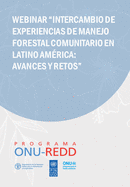News
Join our webinar “Open and Transparent Forest Data: Innovation and Technology for Climate Action”
28/10/2020
28/10/2020

A key pillar of the Paris Agreement is the Enhanced Transparency Framework (ETF), which aims to raise ambitions for climate action through transparent country reporting. The development of National Forest Monitoring Systems (NFMS) with open and transparent data can enable action for forest and climate. In light of the climate emergency, it is time to scale up efforts toward accurate, open and transparent forest data, to catalyse higher ambitions under the Paris Agreement.
The new FAO webinar “Open and Transparent Forest data: Innovation and Technology for Climate Action” will highlight global and national efforts’ on forest monitoring that support the implementation...

Rocío Cóndor is an FAO Forestry Officer working on the Enhanced Transparency Framework and coordinating the GEF-funded Capacity-building Initiative for Transparency work related to the forest sector, known as CBIT-Forest. In an interview, she reflected on the ways solid data can inform good decisions when it comes to sustainable forest management.
What does your work entail?
I work at the Food and Agriculture Organization of the United Nations (FAO) where I support GEF-funded projects related to the Capacity-building Initiative for Transparency. This initiative helps developing countries track their progress toward meeting the Paris Agreement, with tools and training to report their greenhouse gas...
Webinar: From reporting to payments: Current state and trends of REDD+ reporting to the UNFCCC
19/10/2020
19/10/2020

GFOI partner the Food and Agriculture Organization of the United Nations (FAO) is organizing a webinar to examine the current state and trends of REDD+ reporting (*) to the United Nations Framework Convention on Climate Change (UNFCCC).
Date: 28 October
Time: 14:00-15:00 CET
Register here to participate
Objectives
Highlight the important progress on REDD+ reporting to the UNFCCC
Reflect on quality of UNFCCC-reported REDD+ results and their ability to underpin results-based payments
Jointly think about likely future development of REDD+ reporting
Launch the paper “From reference levels to results reporting: REDD+ under the UNFCCC – 2020 update”
Agenda
Why do countries dedicate their efforts to reporting their REDD+ results to the UNFCCC?...

GFOI partner the Food and Agriculture Organization of the United Nations (FAO) is inviting to a discussion session on how forest monitoring can catalyze change on the ground by informing policy-making and enabling better forest management.
Date: 14 October
Time: 14:00-15:00 CEST
Register here to participate
Diverse types of forest data and analyses contribute to solving problems in public policy and corporate activities. The FAO team has reviewed a large number of country cases to identify what types of forest monitoring are most suitable to inform decision-making and what constitutes an open window of opportunity for relevant information to enable change.
Thinking about impacts that the right...

Date: 13 October
Time: 10 a.m. Panama City time; 11 a.m. New York time; 5 p.m. Rome time; 10 p.m. Bangkok time
Please register here
Link: https://fao.zoom.us/j/98867103022?from=msft (password: 377368)
Language: Spanish
Forests are home to 80% of the world's terrestrial species of animals, plants and insects. Today, however, this biodiversity is seriously threatened and millions of hectares of forests are lost every year. Community forest management (CFM) is one of the most promising solutions to finding a compromise between the preservation of nature and economic development. Currently, CFM is a strategic alternative that must be promoted and upscaled in order to conserve, sustainably manage and...

